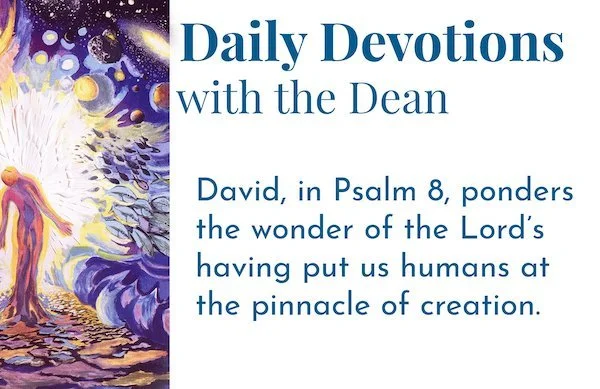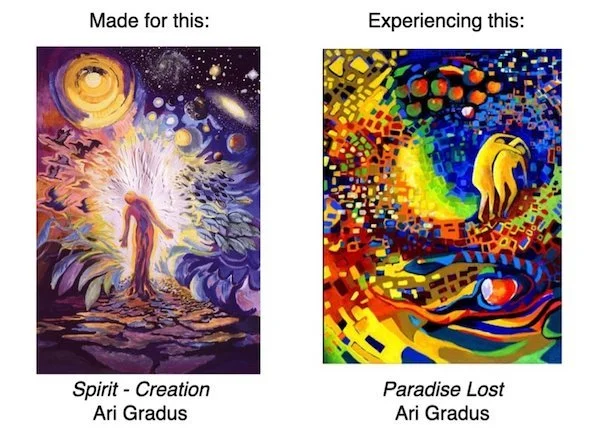Thursday • 5/9/2024 •
Thursday of the 6th Week of Easter
Today is the Feast of the Ascension of Christ
This morning’s Scriptures are: Psalms 8 & 47; Daniel 7:9-14; Hebrews 2:5-18; Matthew 28:16-20
This morning’s Canticles are: Pascha Nostrum (“Christ Our Passover,” BCP, p. 83); following the OT reading, Canticle 8 (“The Song of Moses,” Exodus 15, BCP, p. 85); following the Epistle reading, Canticle 19 (“The Song of the Redeemed,” Revelation 15:3-4, BCP, p. 94)
You give him mastery over the works of your hands; you put all things under his feet. — Psalm 8:7. The majesty of the heavens makes David, in Psalm 8, ponder the wonder of the Lord’s having put us humans at the pinnacle of creation. David is in awe of the status that we have been given—crowned with glory and honor, overseers of a dominion where everything is life, no death; cooperative effort, minus coercion or corruption; productivity without waste.
I love the way the artist Ari Gradus (www.ari-gradus.com) imagines our relationship with the creation in his painting Spirit - Creation. The form of Adam emerges from the ground. His posture is one of wondrous praise. It’s as though all earth’s plenitude streams out from him, or at least revolves around him—as though the glory of image-bearing flows out with its own creative, life-giving energy. Even though that’s an inversion of the order of the Genesis account, it captures the biblical logic of humans being the fulcrum and crown of creation.
And yet…
As it is, we do not yet see everything in subjection to them… — Hebrews 2:8b. Perhaps one of the greatest understatements of all time. The writer to the Hebrews takes up Psalm 8’s celebration of the dignified place of humans in the scheme of things. But he notes that what we see—what we experience—is not what Psalm 8 envisions. As it is, we don’t see humans large-and-in-charge. As it is, we don’t see humans proudly reflecting the glory. As it is, we don’t see ourselves here and now as lords and ladies of God’s creatures.
In a second painting, titled Paradise Lost, Ari Gradus captures this “As it is…” insight. No, since the Garden, “we do not see everything in subjection to him.” Instead, the bitter fruit of the bite from the forbidden fruit leaves us cringing and fleeing for shelter. Creation devolves into a serpentine swirl of threatening globs, all of them indistinct, except for the ones in the shape of the forbidden fruit. Adam and Eve have dropped the fruit with the missing bite to the ground, where it lies at the front of the painting. Several forbidden fruit seem to chase the unhappy couple down, threatening to rain down upon them.
“As it is,” indeed. We are supposed to be the crown of creation. But starting early in 2020, we found ourselves plagued by an ironically named coronavirus, “corona” being the Latin word from which we get “crown.” Originally, “corona” meant a “wreath” of honor or “garland” of majesty. The microscopic coronavirus is covered with super-microscopic crowns. When the coronavirus invisibly invades our being, it connects itself to our lungs with those grabby crowns, so it can claim us and kill us. It’s brought our economy to its knees. It’s made us mask ourselves from one another and has caused us to be fearful of getting within six feet of each other. Even the confinement it has forced on us has led to things like increased domestic violence and substance abuse. The helplessness we feel, the sense of attack we experience—they are a parable of what it is to live with “Paradise Lost.”
…but we do see Jesus… — Hebrews 2:9a. Then again, this is Ascension Day. And the writer to the Hebrews doesn’t quote Psalm 8 to push us further into despair. He wants us to look up and see that at the right hand of the Father sits Jesus. There in advance of us is our Champion—once “made lower than the angels” and “suffering…death and tasting death for everyone,” now “crowned with glory and honor [also] for us” (Hebrews 2:9). He is there because paradise has been regained.
There, according to the writer to the Hebrews, quoting Psalm 22:22, he proclaims the Father’s name to us, a name of holy blessing (Hebrews 2:12; and see Numbers 6:23-27). And there, according to the same psalm, he sings a hymn of praise to the Father (Hebrews 2:12). He proclaims the truth that our sins have been atoned for, “our hearts sprinkled clean from an evil conscience and our bodies washed with pure water” (Hebrews 10:22). He sings us out of shame and into his fellowship as his brothers and sisters (Hebrews 2:11). He announces—and loudly, I submit!—that he has “destroy[ed] the one who has the power of death, that is, the devil, and free[d] those who all their lives were held in slavery by the fear of death” (v. 15). As “merciful and faithful high priest,” he tunes our voices for the singing of praise to the Father who has provided complete atonement and timely help (2:18; see also 4:16).
Collect of the Day: Ascension Day. Almighty God, whose blessed Son our Savior Jesus Christ ascended far above all heavens that he might fill all things: Mercifully give us faith to perceive that, according to his promise, he abides with his Church on earth, even to the end of the ages; through Jesus Christ our Lord, who lives and reigns with you and the Holy Spirit, one God, in glory everlasting. Amen.
Be blessed this day.
Reggie Kidd+




